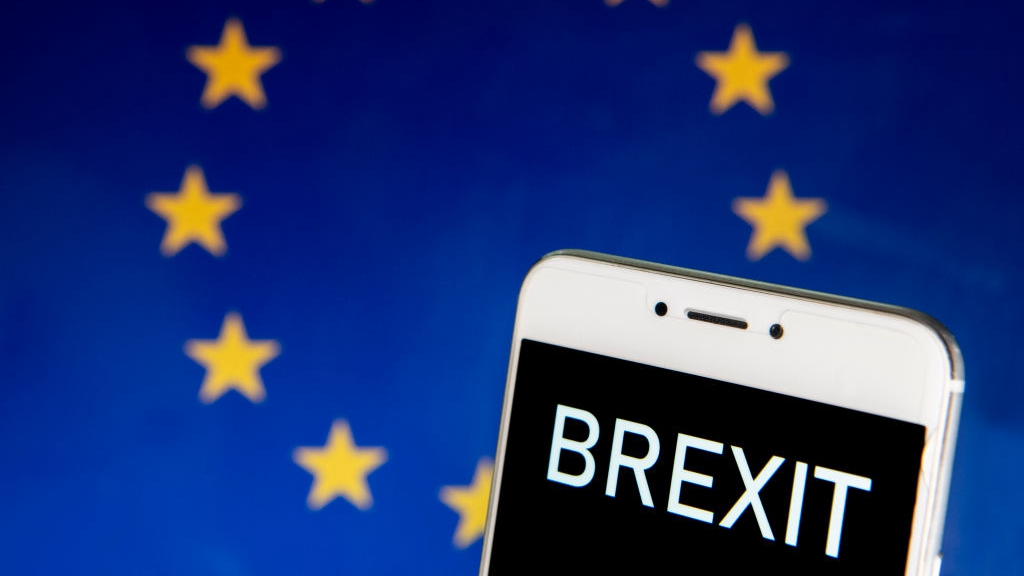
Opinion
12:46, 23-Apr-2019
Do Britain's European election results affect Brexit?
Tom Fowdy

Editor's Note: Tom Fowdy, who graduated with an MSc in Chinese Studies from Oxford University and majored in politics at Durham University, writes on the international relations of China and the Democratic People's Republic of Korea. The article reflects the author's views, and not necessarily those of CGTN.
Following UK Prime Minister Theresa May's inability to pass her withdrawal agreement with the European Union through the House of Commons, and her subsequent failure in securing a "short term delay" to the date of Britain's departure at the European Council, the United Kingdom has no choice but to participate in the upcoming European Parliament elections on May 26.
What most people will be wondering, of course, is just what the significance is of these elections. Can the delegation which the United Kingdom sends exert any kind of meaningful influence to the process of Brexit? Do they change the government's negotiating hand? Or for that matter that of the European Union?
The answer is: not a great deal. Whoever is present in the European Parliament on behalf of UK constituencies has no direct involvement in the process of Brexit whatsoever.
The European Parliament is a body which scrutinizes and votes on legislation created by the commission and lacks the initiatory power of national legislatures. Given this, it plays no leading role in the state-to-state "high-level politics" involving the negotiation of treaties.
As a result, British voters tend to see EU elections as a "low stake" event and usually target it for protest based voting. Nevertheless, a show of strong support for pro-Brexit parties in the final result may act to put pressure on the party's contemplating a reversal of Britain's departure, thus exerting an indirect political influence.
The European Parliament is a unique institution in that it is inherently transnational. It is a legislature consisting of representatives from each EU state, allocated seats in proportion to that country's population, functioning in a system of broad cross-party alliances held together in ideological groupings.

Scottish Liberal Democrat leader Willie Rennie (Middle) introduces his party's candidates for the European elections on Calton Hill, Edinburgh, Scotland, April 18, 2019. /VCG Photo
Scottish Liberal Democrat leader Willie Rennie (Middle) introduces his party's candidates for the European elections on Calton Hill, Edinburgh, Scotland, April 18, 2019. /VCG Photo
However, its operations are limited in comparison to a national legislative body. The European Parliament cannot create or initiate legislation, with such privileges being the treaty right of the European Commission, European Council and the Council of Ministers.
Its role is exclusively to pass, scrutinize and oversee laws created by these bodies; given this, it has no power to set or constrain the agenda of European politics.
This means on the matter of Brexit, the European Parliament is for the most part irrelevant. Members of the body have no role, place or ability to determine the agenda or sway of negotiations on the process of Britain's departure.
Brexit should be understood as a “High politics” issue on the European agenda, which means it is dealt with not on the matter of everyday European legislation and regulations, as to what the parliament and its committees oversee, but as a treaty issue which owing to the bloc's structure takes place between national leaders and the commission.
Whilst the parliament itself may play a role in ratifying the final deal, this itself would be a formality. Otherwise, it is out of their jurisdiction.
As a result, outside observers to the upcoming European election must understand that the overall result will not change anything pertaining to Brexit. Whether British voters send the newly formed “Brexit party” as the largest delegation to the bloc, or parties opposing Brexit, means little in the long run.
Despite this, owing to the “low stakes” nature of European elections, many British voters continue to approach the European Parliament with an attitude of expressing political discontent, that is “protest voting” – whereby voters abandon their traditional allegiances and vote for parties they might not consider as a political government.

Protesters against Brexit and the possible imposition of any hard border between Northern Ireland and Ireland gather with a banner at the border, April 18, 2019. /VCG Photo
Protesters against Brexit and the possible imposition of any hard border between Northern Ireland and Ireland gather with a banner at the border, April 18, 2019. /VCG Photo
It is a famous convention in Britain that the governing party rarely ever wins European Parliamentary elections as a result. Given this protest attitude, the elections have been increasingly dominated by Eurosceptic parties.
In 2014, UKIP won the highest number of seats, setting the stage for David Cameron to pursue the referendum on Brexit which lead the country to where it is today.
Given this, whilst the eventual outcome will not change anything pertaining to Theresa May's situation, what it may do is shift the political paradigm in Britain as to where the country stands on Brexit.
For example, if Nigel Farage's new "Brexit party." currently leading the polls, returns the highest number of seats, it may be interpreted by politicians that pro-Brexit sentiment and mobilization is still strong.
This may convince parties sitting on the fence, such as the Labour Party, that it is not politically expedient to pursue an end to Brexit via a second referendum, and, of course, vice versa, if pro-remain parties gain ground.
As a whole though, the European Parliament elections are not going to be dramatic. As a low-stakes parliament concerned with everyday European law created by the commission, it operates outside to the high-level multi-governmental dilemma of Brexit.
Thus, no matter what happens, there will be no direct change in fortune for Theresa May's government and the current gridlock, it will continue unabated for the time being.
What will happen is that the election will reflect a show of discontent from the British electorate which will give some inference, although not comprehensively, about its attitude to Brexit.
This will at the most give politicians some pause for thought about what they should do next as they strive to break out of the six-month impasse.
(If you want to contribute and have specific expertise, please contact us at opinions@cgtn.com)

SITEMAP
Copyright © 2018 CGTN. Beijing ICP prepared NO.16065310-3
Copyright © 2018 CGTN. Beijing ICP prepared NO.16065310-3